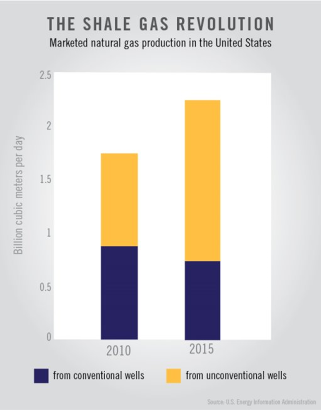U.S. is net exporter of natural gas, thanks to innovation

Feature Highlight
Worldwide, Qatar is the top exporter of LNG, shipping almost 30 percent of the world’s supply. Australia, Malaysia, Nigeria and Indonesia are other top LNG exporters.
For the first time in six decades, the U.S. will export more natural gas than it imports. That balance is due largely to U.S.-pioneered technologies that have revolutionized the energy sector.
“America will be a faithful and dependable partner in the export and sale of our high-quality and low-cost energy resources and technologies,” President Trump said earlier this year.
Innovation on two fronts helped make the U.S. an exporter in natural gas, a fuel that is commonly used for home heating, electricity generation and industrial production.
`American shale revolution’
First, techniques the U.S. Department of Energy helped develop became more widely used in the private sector over the past 10 years. These technologies allowed companies to tap into previously unrecoverable gas and extract natural gas from shale rock formations. These unconventional methods are called horizontal drilling and hydraulic fracturing, commonly called fracking.
These techniques helped launch what’s known as the “American shale revolution,” enabling U.S. companies to increase shale gas production more than 11 times from 2007 to 2015, according to the most recent analysis available.
Now that America is producing more of the energy that it uses, the country relies less on imports, increasing energy security. An estimated 95 percent of American natural gas produced in the U.S. is used in the United States, leaving about 5 percent for export.
A new way to transport natural gas
Another big change focuses on the way energy companies deliver natural gas to customers.
In the past, producers transported natural gas only through physical pipelines. But now, natural gas can be shipped anywhere in the world if it is converted into liquid form. Liquefied natural gas, commonly known as LNG, can be chilled and safely transported via specialized tanker ships and delivered anywhere with LNG facilities. That’s a big deal for countries’ energy security.
Lithuania, for example, relied on pipelines from one source to deliver natural gas until 2014. This source, Russian energy giant Gazprom, was able to charge high prices with the market to itself. But when Lithuania developed the capability to import LNG, it could buy natural gas from anywhere in the world.
Prices for natural gas dropped 20 percent from 2014 until 2015 in Lithuania. Better prices helped consumers, and diverse sources of energy supply boosted the Baltic nation’s security.
“Growing LNG supply from the U.S. means more competition, liquidity and supply diversity that will make global gas markets more flexible, efficient and secure,” said Jason Bordoff, an energy expert at Columbia University. “Gas will trade more like oil, meaning market forces will determine price and where supply flows.”
Worldwide, Qatar is the top exporter of LNG, shipping almost 30 percent of the world’s supply. Australia, Malaysia, Nigeria and Indonesia are other top LNG exporters. In 2016, the United States exported 1.1 percent of the world’s LNG supply. That share is expected to grow somewhat as more U.S. companies build infrastructure needed to export LNG.
Other Features
-
Lessons from Lesotho for low-income countries
For years, global development practitioners have been trapped in a false choice of aid versus trade. Lesotho tried ...
-
Unlocking opportunity: Why mobility is key to Nigeria’s prosperity
Transforming mobility in Nigeria requires a collective, system-wide approach from key stakeholders across the entire ...
-
5 best virtual cards for Apple Music subscription in Nigeria
Discover the 5 best virtual cards for Apple Music in Nigeria: Cardtonic, Tribapay, Klasha, Vesti, and SnappyPay, ...
-
Unlocking opportunity: How poultry can catalyse prosperity in Nigeria
According to a recent survey, 45% of Nigerians – equivalent to 92.7 million people – do not consume ...
-
How the ISA 2025 reshapes Nigeria’s crowdfunding regulation
The Investment and Securities Act 2025 expands the SEC’s oversight functions, mandates the registration of all ...
-
The tragedy of Emmanuel Macron
The contrast between Macron’s early promise and his current image seems almost theatrical.
-
Unlocking opportunity: A new vision for eye care in Nigeria
Pull Quote: Market-Creating Innovations Opportunities in Nigeria Series – Part 1 of 7.
-
Open banking will revolutionise financial services in Nigeria
Open banking is poised to unlock unprecedented opportunities for innovation, foster healthy competition among ...
-
Redefining global trade: Africa's strategic role in a multipolar world
BCG's report provides insights into how African business leaders can position for the future by investing in ...
Most Popular News
- NDIC pledges support towards financial system stability
- Artificial intelligence can help to reduce youth unemployment in Africa – ...
- Cassona Global Imaging marks 3rd anniversary
- ICRISAT launches 2025–2030 strategy to shape the future of agriculture
- Bank of Agriculture signs $1 billion financing programme
- WTO agreement on fisheries subsidies enters into force














